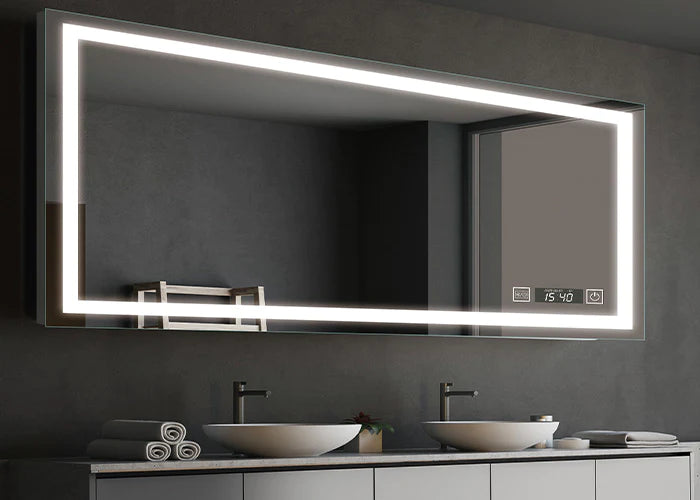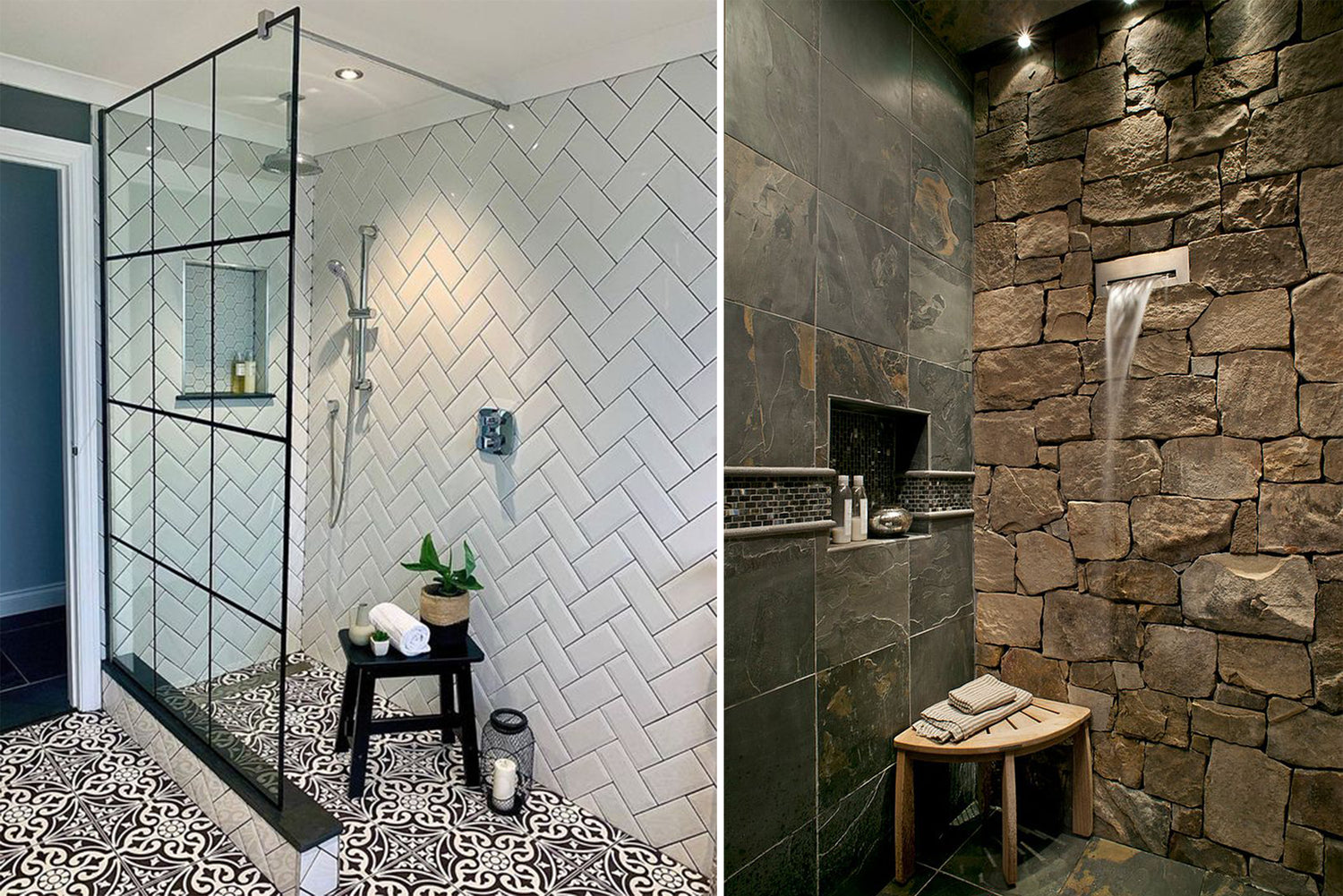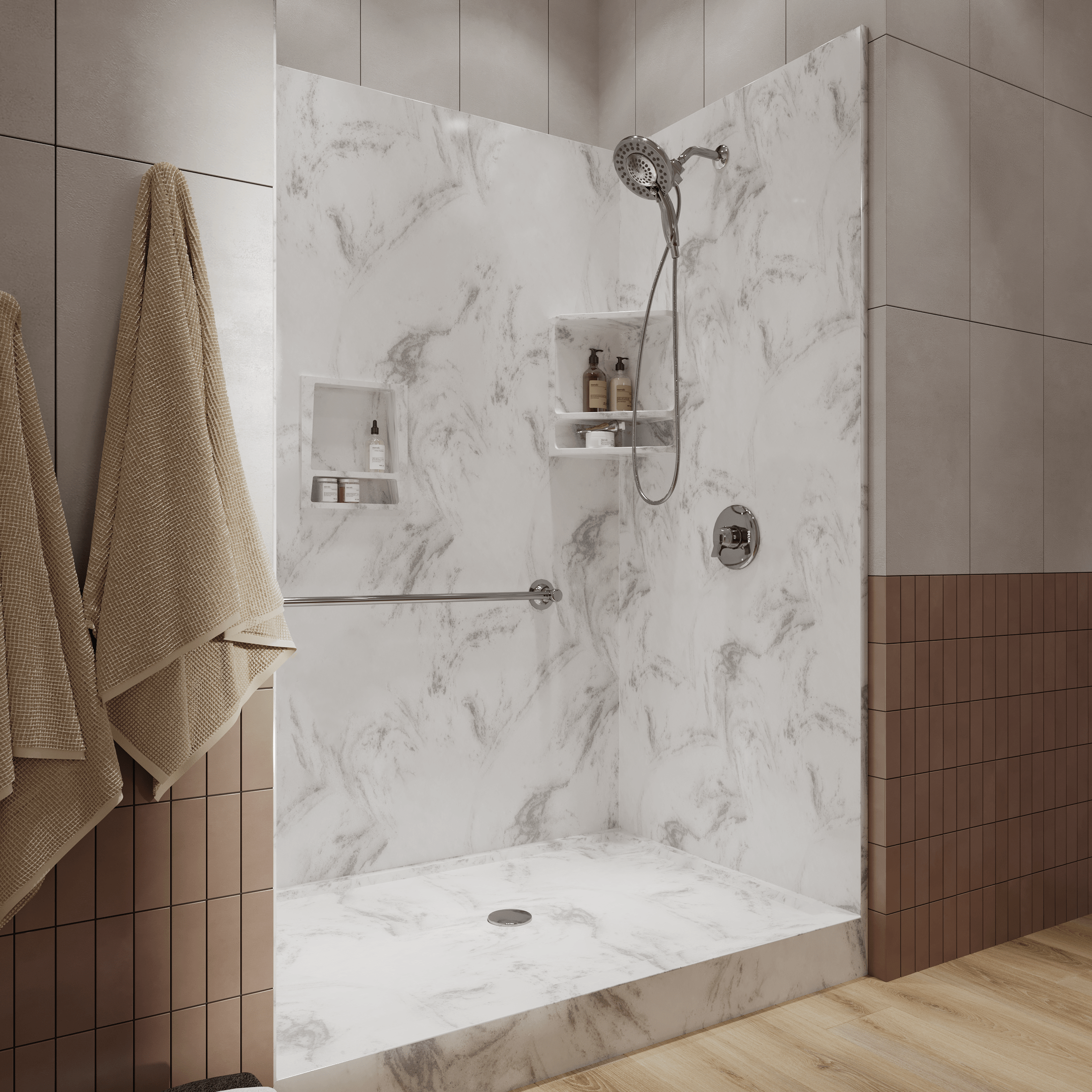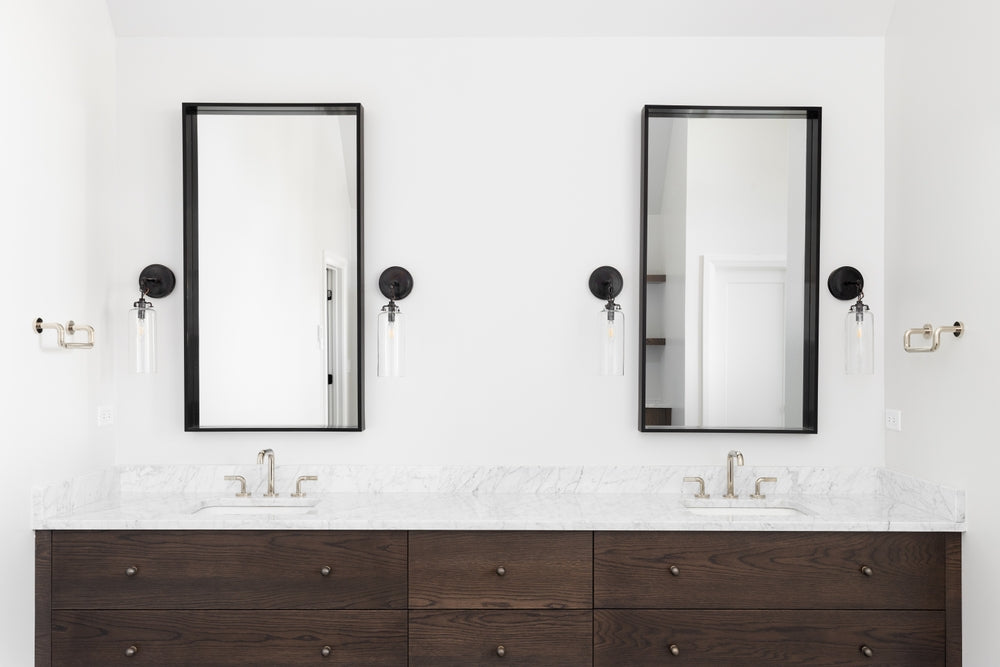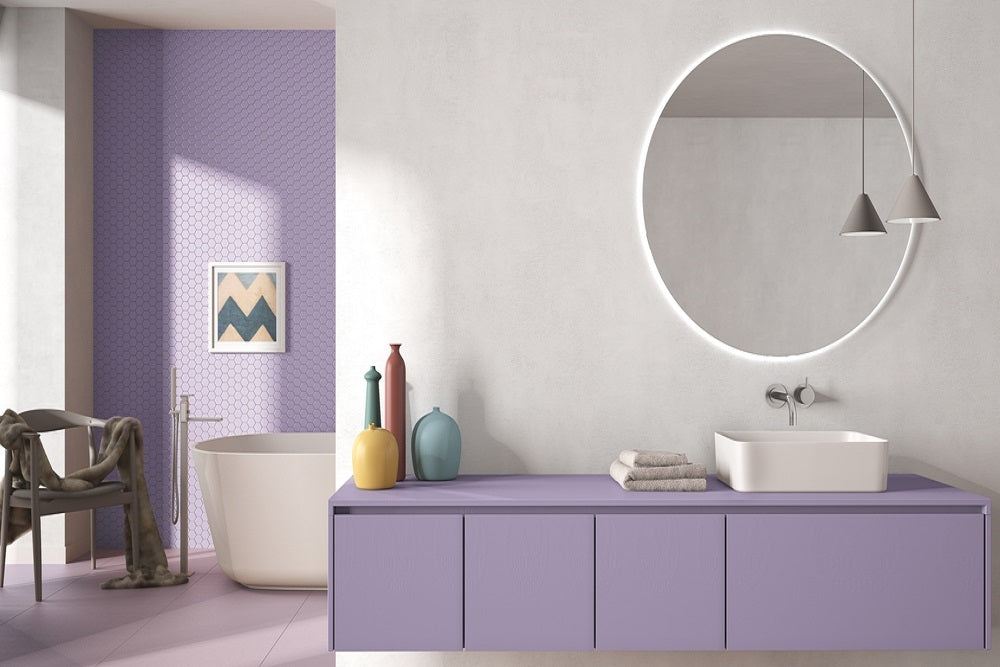 Table of Contents
Table of Contents
Choosing the right shower wall material is key to your bathroom remodeling success. Shower walls are intended to last for a long period of time, therefore, you should choose a material that is both durable and decorative.
Some of the most common materials for shower walls include glass, acrylic, concrete and procelain. there is a wide range of additional options to choose from depending on project budget, personal style, and maintenance requirements. Here we discuss 11 materials for shower walls, how durable they are and how to maintain them.
11 Materials For Shower Walls
1. Glass
As long as the high cost of glass tiles is factored into your budget, it's a great material for a shower wall. Most commonly, this material is available in the form of squares or rectangles, however, for a more customized look, you may want to consider mosaic glass. As with standard glass tiles, mosaic glass offers the same benefits, however, its shapes and colors are unlimited. Shower walls made of glass are easy to keep clean, mold and mildew do not grow on them, and stains do not stick to them due to their nonporous nature. Despite this, this material will crack, chip, or scratch easily.


2. Acrylic
There are many reasons to choose acrylic for shower walls, including the fact that it is cost-effective, resistant to mold, and comes in an array of colors, patterns, and styles to suit any decor. It is usually available as one large panel or in several panels, which experienced DIYers can install themselves.
When installing acrylic shower walls, it is important to keep in mind they are susceptible to damage caused by scratching, rubbing, and impact. Take care to avoid scratching, scraping, or damaging acrylic so as to avoid damage and unpleasant marks.
3. Concrete
As a décor material, concrete is undeniably powerful. The sound from outside is subdued, the external light appears soft, and touching the soft, stone-like wall surfaces surrounding you, a private industrial oasis opens up before you.
There is a high degree of porosity in concrete, causing it to stain easily. You need to take caution with shower products that can contain strong dyes that can stain. Concrete is luxurious and is easy to maintain. If kept clean.

4. Natural Stone
It is a great way to add a touch of style to your bathroom by installing natural stone tiles in the shower. Due to the irregular formation of each tile, it has a unique pattern, creating a natural effect that cannot be replicated with cheaper materials. Nevertheless, if you're anxious about costs, you should also note they can last for several decades without needing replacement, provided you clean and maintain them regularly.
A durable material that resists heat, abrasion, and damage from impacts. Natural stone has the disadvantage of being porous, which makes it prone to staining and water damage if it is not properly sealed and refreshed every 1 to 2 years.
5. Fiberglass
Compared to glass tiles, fiberglass shower walls are more durable, and you can often install them in your bathroom as a sheet. Additionally, they are thick, noise-proof, and cost-effective, as well as water-resistant.
However, homeowners should be aware, that fiberglass does not provide a tight seal when it comes to walls or ceilings adjacent to the fiberglass. As well as being bulky, fiberglass shower walls also get scratched pretty easily, making them suitable for homeowners who plan to replace them over time.
6. Wood
A warm, organic, natural environment. When it comes to bathroom walls, you can't go wrong with wood. The perfect material for saunas due to its ability to withstand humid conditions, wood can be shaped and sized to meet your decor needs. It is better to choose a type of wood that can withstand heat and water splashes in bathrooms. The surface should be thoroughly sealed. It is possible for wood to warp, therefore, despite its beauty and feel, maintenance and replacement will be required to avoid warping.
Try to avoid using harsh chemicals on the wood an stick to neutral cleaners and only use soft microfiber cloths.
7. Marble
The beauty of marble cannot be matched by anything else. Natural stone offers an elegant look that no other material can match. Your shower walls will look beautiful with this stone. Shower walls made from marble are amazing.
Marble's best feature is its appearance. In comparison to all other ideas for shower wall materials, it is the most eye-pleasing. The durability of marble is exceptional. If you take care of it, it will last for a long time. There are some drawbacks associated with this high-end stone as well. Natural stone, such as marble, has a porous structure. As a result, it is extremely susceptible to staining.
8. Laminate Panels
You can save money by installing wall panels instead of replacing the entire shower tiles. The best choice for you is wall panels. Your shower wall can be directly covered with these wall panels. The shower head and bathtub area won't be affected either. No need to replace your shower when you have this option.
As well as being the least labor-intensive, it is also the most convenient. These tiles can be stuck onto your pre-existing shower tiles. Due to the lack of grout, this option is also mold- and mildew-free and easy to wipe clean.

9. Ceramic
Homeowners who love DIY projects will appreciate ceramic shower walls. Tiles made of ceramic are available in a wide variety of colors, patterns, and dimensions, and can easily be installed by yourself. You can add style to your bathroom with ceramic shower tiles, and ceramic shower tiles look like natural stones, but they are inexpensive.
Also, they are affordable and resistant to water, but they may over time grow mold or mildew. You can use harsh cleaners on ceramic shower walls, so you can prevent and treat any mold growth.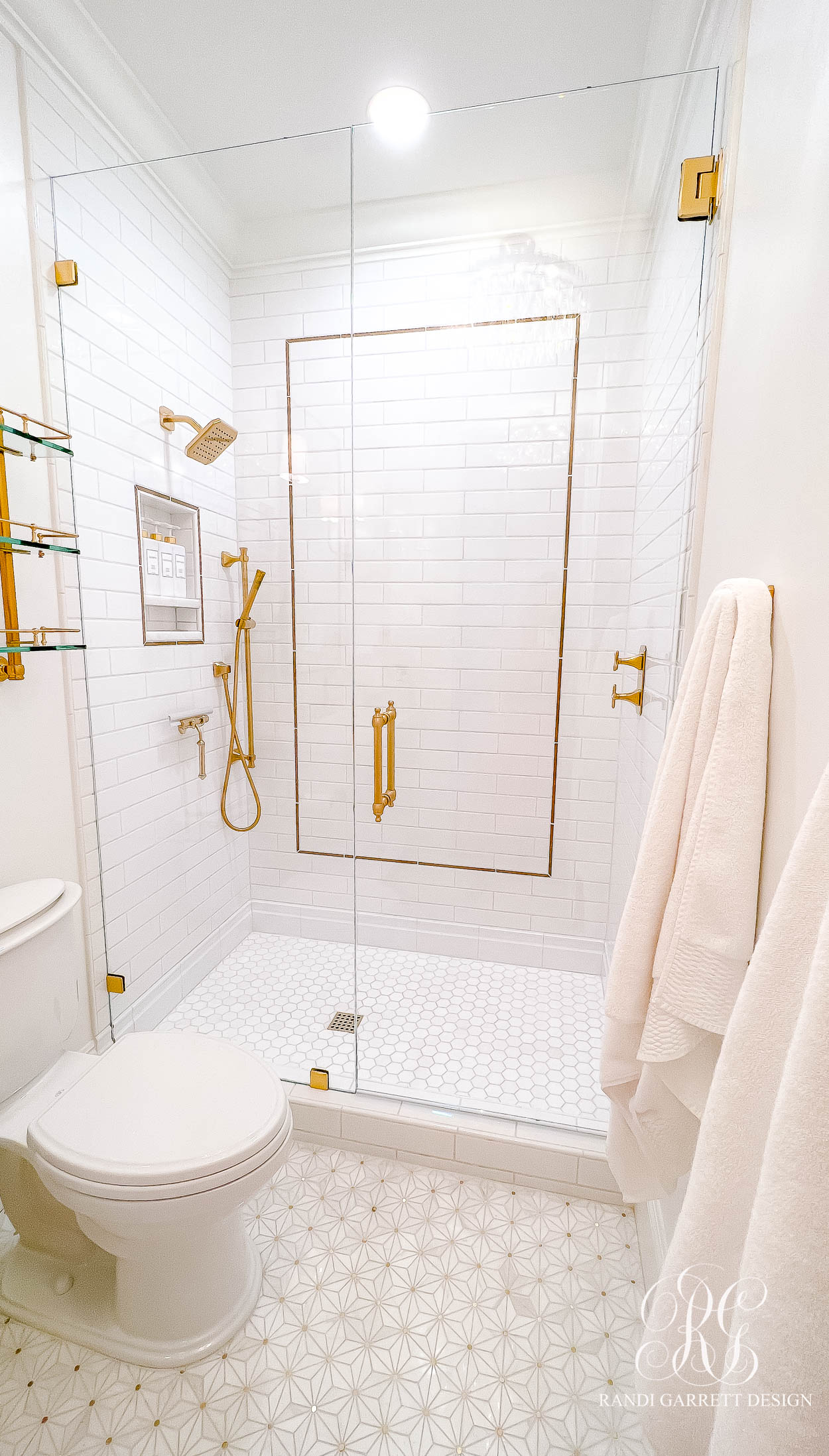
10. Granite
There are several beautiful options for bathrooms, including granite. A variety of colors are available in this natural stone tile, and the granite naturally forms patterns that vary from tile to tile. In addition to being heat-resistant, scratch-resistant, and stain-resistant, granite is unfortunately it can be affected by water. There is no doubt that this will seem like a major problem, due to the constant presence of water, however, when granite is sealed properly and resealed once to twice every year, there will be no issue with water. Although granite is highly durable, one of the primary drawbacks to using it for shower walls is its high cost.

11. Porcelain
Adding porcelain shower walls to your bathroom creates a classic aesthetic look that is less expensive than natural stone. Compared to ceramics, they are considered to be of a higher quality, and they are water-resistant and durable in spite of their intricate appearance.
In addition to offering a timeless look, porcelain shower walls also provide an installation that can be easily repaired. Porcelain surfaces are prone to slippage when they get wet, but texturing them fixes that problem. 
Whatever materials for shower walls you decide on, your investment will be well worth it. No matter what material you opt for, you will enjoy beautiful and long-lasting shower walls as long as you do your research for which offer the features you are looking for.

